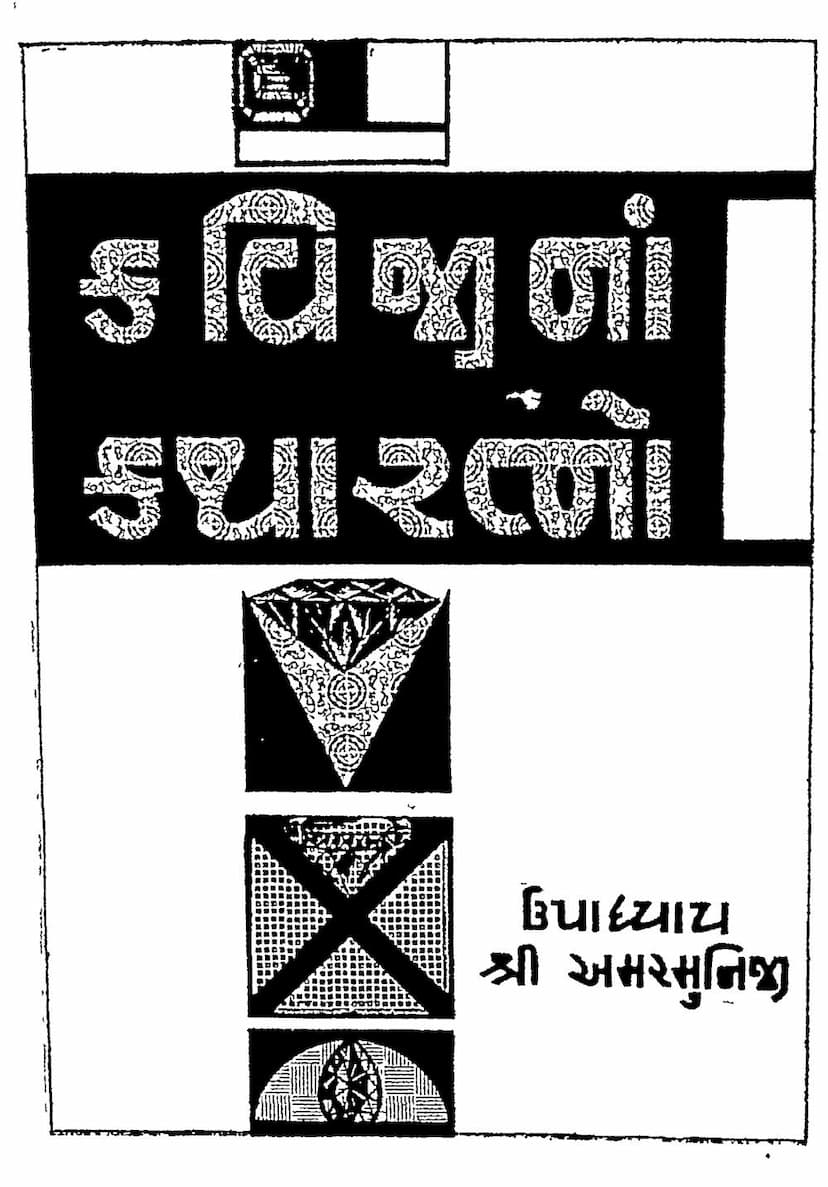Kavijina Katharatno
Added to library: September 2, 2025

Summary
This is a comprehensive summary of the Jain text "Kavijina Katharatno" by Upadhyay Shri Amarmuni (Kaviji Maharaj), translated by Ratilal Dipchand Desai. The book is published by Gurjar Granthratna Karyalay.
Overview:
"Kavijina Katharatno" (Jewels of Stories by Kaviji) is a collection of inspiring and morally instructive anecdotes compiled from various sources, primarily attributed to the teachings and writings of Upadhyay Shri Amarmuni. The book aims to impart spiritual wisdom, ethical guidance, and profound life lessons through engaging narratives. The stories cover a wide range of themes, including compassion, truth, karma, the nature of the soul, the importance of self-control, the dangers of ego, and the path to liberation.
Key Themes and Characteristics:
- Spiritual Wisdom and Ethical Guidance: The core of the book lies in its ability to convey complex Jain philosophical concepts and ethical principles in an accessible and relatable manner through storytelling.
- Inspirational Narratives: The stories are designed to inspire readers towards a more virtuous and spiritually conscious life. They often highlight the consequences of negative actions and the rewards of positive ones.
- Focus on Jain Principles: While drawing from diverse spiritual traditions (as indicated by the inclusion of stories from Buddhist and Islamic traditions, and references to figures like Buddha and Prophet Muhammad), the overall tone and message are deeply rooted in Jain philosophy, emphasizing non-violence (ahimsa), equanimity (samata), truthfulness (satya), non-possessiveness (aparigraha), and the pursuit of self-knowledge.
- The Author's Persona (Kaviji Maharaj): The preface and introductory notes portray Upadhyay Shri Amarmuni as a deeply compassionate, loving, learned, and enlightened soul. He is described as someone who embodies universal love and whose words and writings are imbued with wisdom and empathy. His broad learning extends beyond Jainism to other philosophies and religions.
- Translator's Contribution: Ratilal Dipchand Desai's role as a translator is acknowledged, noting his effort to convey the essence of the original Hindi narratives into Gujarati, sometimes adapting phrasing for better flow while maintaining the original meaning.
- Dedicatory Preface: The book is dedicated to the memory of the publisher's younger brother, Shri Jagmohanlal Kora, marking the tenth anniversary of the book series.
Content Highlights (Illustrative Examples from the stories):
The book contains 92 short stories, each with a distinct moral. Here are a few illustrative examples of the types of stories and the lessons they convey:
- Maha Karuna (Great Compassion): A story illustrating Lord Mahavir's boundless compassion even towards those who caused him immense suffering, like Sangam, highlighting the principle of seeing the inherent divinity in all beings and responding to malice with love.
- Sachu Dhan (True Wealth): A story where Lord Buddha teaches a wealthy man that true wealth lies not in material possessions but in inner virtues like truth and non-violence, which are constantly being depleted by worldly desires.
- Pahlo Sathi, Pachhi Swarg (First Companion, Then Heaven): A story from the Mahabharata where Yudhishthira refuses to enter heaven without his loyal dog, emphasizing loyalty and compassion towards even the humblest beings.
- Satyano Bal (The Power of Truth): A story about a thief who, inspired by Lord Mahavir's teachings, resolves to speak only the truth, leading to unexpected positive transformations in his life and community.
- Krodh Chandal Chhe (Anger is Worse than an Outcaste): A story contrasting outward purity with inner purity, showing how a learned scholar's anger makes him spiritually impure, even when interacting with an outcaste.
- Bhul Mari (My Mistake): A story illustrating the humility and accountability of leaders like Gopal Krishna Gokhale, who readily accepted responsibility for their actions, even when it involved their children.
- Taro Ma Mahendra Thai (If Your Mind is Right, Everything is Right): The story of a merchant who encountered different levels of hospitality based on the host's perception of his inner state and intentions, highlighting the concept of "as you think, so you become."
- Jan Seva: Mahavirni Aagna (Service to Humanity: Mahavir's Command): Emphasizing that true devotion to Mahavir lies in serving humanity and alleviating suffering, rather than just rituals.
- Nirdosh Shaurya (Innocent Valor): A story about a brave warrior who demonstrates his valor not through violence but through adherence to truth and righteousness, even when facing powerful adversaries.
- Ap Saman Bal Nahi (There is No Strength Like Oneself): Stories emphasizing self-reliance and inner strength.
- Mano Kant (The Rust of the Mind): A story illustrating how negative thoughts and attachments (like rust) tarnish the mind and prevent it from realizing its true potential, even when exposed to spiritual truths.
Significance and Purpose:
The book serves as a guide for spiritual seekers, offering practical examples of how to live a life aligned with ethical and religious principles. It aims to foster a sense of detachment from worldly pleasures, cultivate virtues like compassion and forgiveness, and ultimately lead readers towards self-realization and spiritual freedom. The collection is rich in content and diverse in its narrative approach, making spiritual learning an engaging and enriching experience.